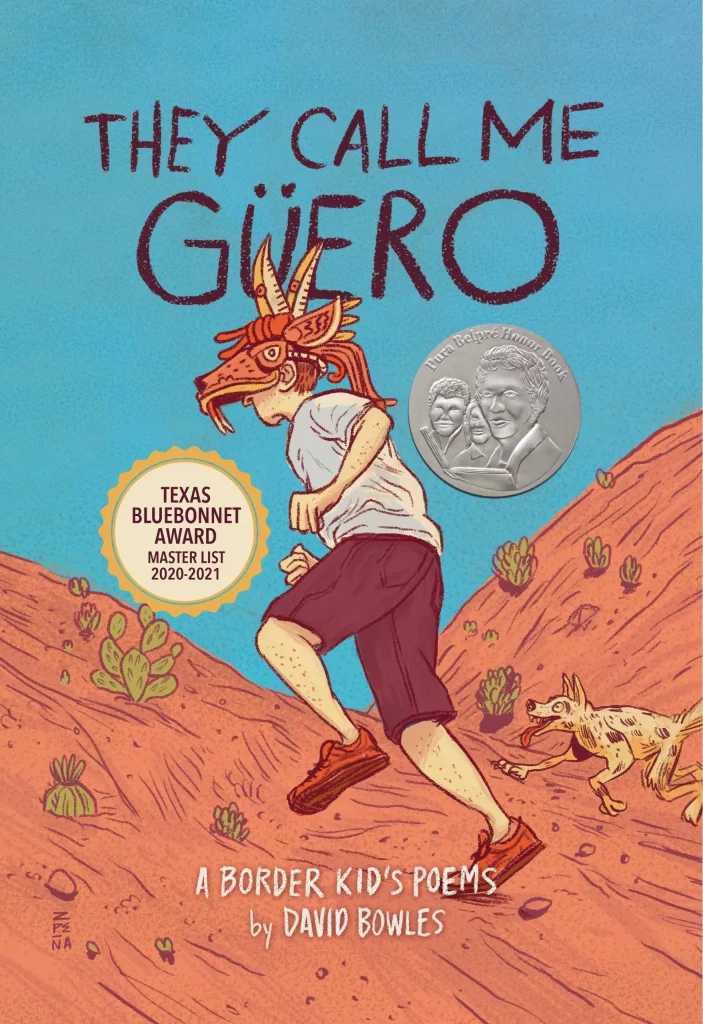
1. Bibliography
Bowles, David. 2017. They Call Me Güero: A Border Kid’s Poems. El Paso, TX: Cinco Puntos Press. ISBN 9781947627062
2. Plot Summary
The book’s protagonist and first-person narrator, Güero (a Spanish nickname that means “pale skinned”), is a redheaded, freckle faced twelve-year-old Mexican American border kid with a penchant for poetry. The nerdy seventh grader, born of an American father and a Mexican mother, guides readers through the holidays, school days, family gatherings, oral traditions, and superstitions that fill his year. Güero, with his heart on his sleeve, even writes about his foray into the world of love with tough-girl Joanna who can call off the bullies with her tenacious spirit. This interlingual book of poetry includes the forms of haiku, sonnet, lullaby, music lyric, free verse, and a multitude of others. The book also includes a translated glossary of many of the Spanish words and phrases used throughout the story.
3. Critical Analysis
In David Bowles’s book about a border kid, stereotypes are nonexistent. In fact, Güero’s poetry points out time and time again that Mexican Americans are not a monolith. Despite the fact that Güero is born of a Mexican mother and a father with skin that’s “deep brown like mesquite bark,” the boy has skin that’s “pasty white, covered in freckles.” Being Mexican American doesn’t mean Güero’s family only likes one type of music either. When Güero considers his family’s musical preferences, readers observe a wide variety of musical tastes: Grandma Manuel likes conjunto, Tío Mike is a Tejano fan, great-uncle Juan likes rock’n’roll, Tía Vero prefers disco, Uncle Danny’s a rap guy, Dad and Joe prefer country, Güero’s sister is into K-pop, reggae, and blues, and Güero likes a little bit of everything. Furthermore, people of many cultures live at the border: “Dominicans, / Koreans, Mexicans, Chicanos, / Black and Native. . .”
Bowles’s refreshingly non-stereotypical characters still hold their Latine culture close. Güero’s intergenerational family ties are deep and strong, as illustrated through his poetry. The boy credits his abuela’s stories, told as she sat in her rocking chair, as the fodder, “like larvae in a chrysalis,” for his storytelling passion. Latine family gatherings are also frequent and important. Christmas Eve day is the time to gather all the relatives, “my mother and her concuñas” plus tías and primas and even the great-grandmother, for tamale-making and all the male relatives for football-watching; and the Fourth of July is a day full of family, quesadillas, music, laughter, and singing (and maybe a little troublemaking too). Marriage and Easter Mass are similarly family-centric and always include just about everybody in the extended family too.
Bowles also entwines the narrative with food—bacon, atole, tacos, shrimp, grapefruit, pizza, raspa, tamales, takis—immersing readers in Güero’s world (a world that often pairs food with family). Interlingual texts that peppers the poetry (Spanish mingling with English) bring the world in which Güero chats “with strangers and friends in both languages” into even sharper focus. Truly, there’s no question that Bowles’s story bursts with authenticity. Readers will find themselves strolling down to the movies with Güero and his crew, the taste of takis on the tongue. Perfect for poetry fans and middle-graders looking for an entertaining slice-of-life, They Call Me Güero is a no-brainer addition to any children’s library.
4. Rewards and Review Excerpts
Tomàs Rivera Mexican American Children’s Book Award, 2019, Winner
Américas Award for Children’s and Young Adult Literature, 2019, Commended Title
Cybils Awards, 2018, Nominee, Poetry
Pura Belpré Award, 2019, Honor, Author
From Kirkus: “In this slim verse novel, Bowles splendidly translates border life via loosely connected vignettes in an eclectic mix of poetic forms.”
From Booklist: “Filled with Spanish dichos and terms, diverse cultures, and Mexican myths, this novel in poems is a clear lens into the life of a Mexican American boy with an identity tied to the struggles, legends, and rich heritage of his ancestors and family, who uses what he learns to move forward.”
5. Connections
There are several poetic forms found in They Call Me Güero— haiku, sonnet, lullaby, music lyric, free verse, and a multitude of others. Show middle-graders to describe their Sundays (like Güero does in his poem “Sundays”) using one of the poetic forms found in the book. If middle-graders feel comfortable, ask them to share their completed poems.
Create a display of They Call Me Güero and other Tomás Rivera Children’s Book Award winners, which may include some of the following selections:
- Morales, Yuyi. Dreamers. ISBN 9780823440559
- Tonatiuh, Duncan. Feathered Serpent and the Five Suns: A Mesoamerican Creation Myth. ISBN 9781419746772
- Quintero, Isabel. My Papi Has a Motorcycle. ISBN 9780525553410
- Pérez, Celia C. The First Rule of Punk. ISBN 9780425290408
- Sánchez, Erika L. I Am Not Your Perfect Mexican Daughter. ISBN 9781524700485
- Stork, Francisco X. The Memory of Light. ISBN 9780545474320
*Note—This book review was created as an assignment for a course at Texas Woman’s University.